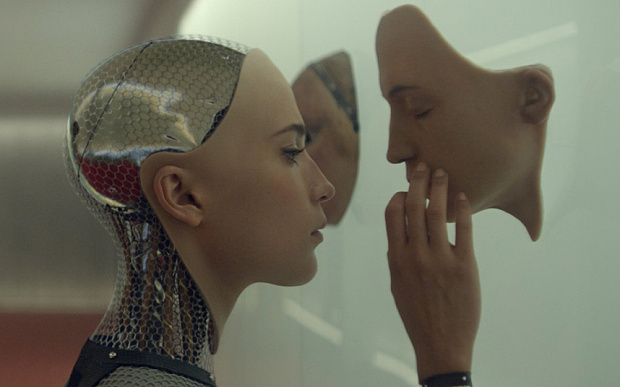
The intensely thought-provoking Ex Machina is a Must See and one of the year’s best films. Set in the present or the very near future, we meet the genius Nathan (played with predatory menace by Oscar Isaac) who developed the worlds top search engine when he was 13 and is now fantastically wealthy. Nathan lives in an extremely remote wilderness with his apparently mute housekeeper Kyoko (Sonoya Mizuno), and brings up one of his smartest software engineers under the pretext of winning a contest for a week with the boss. But Nathan really has brought in the young coder Caleb (Domhnall Gleeson) to test his latest invention – a machine equipped with artificial intelligence.
Specifically, Caleb is tasked with the Turing Test (named after Alan Turing, the subject of The Imitation Game) – he is to converse with the machine to determine whether it’s thinking and behavior is indistinguishable from a human’s. Nathan and Caleb reference that a chess-playing computer may be very efficient, but does it know that it’s playing chess and does it know what chess is? Nathan says that – if he has succeeded – he has the greatest advancement in the history of the world; Caleb rejoins that it would be the greatest invention in the history of gods.
That raises the issue of playing god. If a being – even one that is human-created – is self-aware, conscious and has feelings and its own thoughts, then who has the right to end its life or take away its liberty? And can it seek liberty on its own?
We care about these questions because the machine, named Ava, is so, well, human. Ava is played by Alicia Vikander, an actress with an uncommonly sensitive face. Vikander’s performance is top-notch, and like Caleb, we are soon seduced into liking her and then NEEDING to protect her.
Ex Machina makes so much so-called science fiction pale in comparison, because it really challenges the audience with the moral implications of a real scientific concept. Not everything set in the future is really SCIENCE fiction. Gravity, a superb movie, was basically a survival tale, and Star Wars was a Quest Fantasy and Avatar was basically a remake of the Western A Man Called Horse. Most movies set in the future are just dumb excuses to put a lot of explosions on-screen. The few recent examples of truly thoughtful sci-fi include I Origins and Her.
Ex Machina is both a great-looking movie and a stellar example of economic filmmaking. There essentially only four characters and one set. Computer graphics aren’t used for empty action eye candy, just to allow an actress to credibly play a machine. Nathan’s house/laboratory looks amazing, and the overall art direction and production design is stellar. The stark landscape surrounding Nathan’s hideaway was shot in Norway.
This is the first directing feature for writer-director Alex Garland, and it’s a triumph. He wrote the screenplay for Danny Boyles’ brilliant 28 Days Later, one of my Zombie Movies for People Who Don’t Like Zombie Movies.
